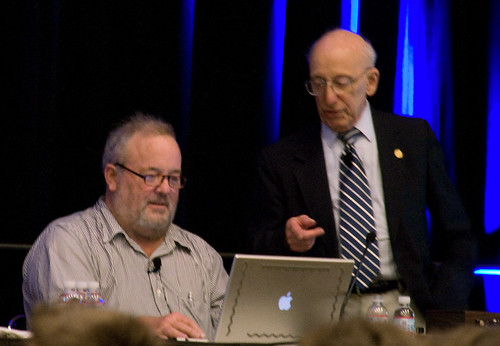Live Forever with Ray
 Thursday, February 21, 2008 at 12:33PM
Thursday, February 21, 2008 at 12:33PM Ray Kurzweil gave the second GDC keynote. He was talking about the next 20 years of games, and specifically the behaviour of exponential growth in relation to human development.
Ray at the GDC
If something increases by a seemingly small percentage at regular intervals, the growth seems to chug along for a little while and then suddenly takes off at an enormous speed. Start with 100 pounds and earn 10% interest per year. After 1 year you get 10 pounds interest. After 2 years you get 11 pounds interest. Three years gives you around 12 pounds. Spool forward a while and the rate of increase really takes off, after 10 years you have over 200 pounds. This is the principle that is supposed to pay off my mortgage, providing the rate of interest stays OK (which of course it hasn't.........)
Anyhoo, back to the keynote. Ray made the point that as technology progresses more and more of our businesses are becoming information based. He reckons that with a move to nano-technology for production industry will be information based, and that with the work on genome sequencing health already is, etc etc. And with exponential growth continuing in the field of information processing for the foreseeable future things are just going to get more and more interesting.
I'm not completely convinced by this argument myself, making wonderful hardware is all very well, but the human race has proved spectacularly inept making software and so I don't think that everything will turn out quite as rosy as the predictions from Ray. Having said that, he is rich and successful and I'm Rob, so we will see.
One thing he said did intrigue me though. Ray reckons that the pace of medical development means that at the moment for each year that goes by we add around 3 months to the average life-span. If this is exponential, and he reckons that now health research is based on information processing it should be, in the not too distant future we will be adding more than a year to the average life-span each year, which means that we are in potential "live forever" territory. I'm not sure where this leaves video games, although I suppose we'll all need something fun to do during our infinite retirement....
 Rob |
Rob |  Post a Comment |
Post a Comment |  Life
Life 
